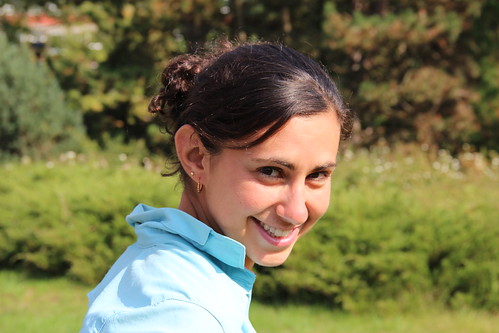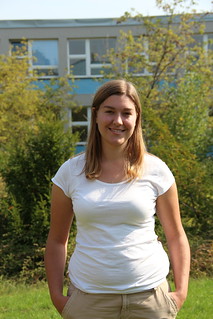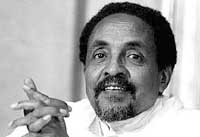Africa
Rachel, Student Reporter 2014–"Translating technical findings for practitioners"
Tue, 09/16/2014 - 13:01 — Pramila Thapa
Rachel Friedman, with a first degree in environment science and masters in science communication, has a passion for translating technical findings for development practitioners and the general public. With experience in blogging and social media, she is excited to report on the research presented at the Tropentag conference 2014, Prague.


Birgit Zipf, Student Reporter—Let's talk directly, across borders
Tue, 09/16/2014 - 12:34 — Helen Sitar When discussing challenges in tropical agriculture, is it actually necessary to talk to researchers from the tropics? Birgit Zipf, second-year student reporter for the Tropentag 2014 conference, certainly believes so! She's tired of attending conferences where German, British, and American presenters are “talking about the ‘others’” from developing regions, instead of inviting and “rather talking with them.” But why is this distinction particularly important to Birgit?
(Continue...)
When discussing challenges in tropical agriculture, is it actually necessary to talk to researchers from the tropics? Birgit Zipf, second-year student reporter for the Tropentag 2014 conference, certainly believes so! She's tired of attending conferences where German, British, and American presenters are “talking about the ‘others’” from developing regions, instead of inviting and “rather talking with them.” But why is this distinction particularly important to Birgit?
(Continue...)
Africa's most valuable innovation in agriculture
Sat, 09/29/2012 - 18:17 — De-Registered User
The Joint Learning in Innovation Systems in African Agriculture (JOLISAA) program, shares recent experiences on innovation processes involving multiple stakeholders and types of knowledge.
Innovation Systems (IS) perspective inspires the framework of the JOLISAA research. IS stresses that the flow of technology and information among stakeholders is key to innovative processes. The project uses several avenues (inclusion/exclusion criteria, storyline, common underlying concepts, and iterative processes) to identify relevant innovations for deeper assessment and joint learning. JOLISSA lists selected innovations in three national inventories (Benin, Kenya, and South Africa).
Jointly, practitioners and researchers assess 13 cases from the existing national inventories. The key steps in this collaborative case assessments are: i) planning meetings, ii) focus group discussions, iii) multi-stakeholders feedback, and iv) literature review.
Soils are like a bank account
Sat, 10/08/2011 - 12:10 — Minette Flora M... An Interview with Prof. Dr. Rattan Lal
“You cannot continue taking money out from the bank without putting it back. So improvement of soil on the basis of what has been taken out from harvesting must be replaced in a scientific manner,” stressed Prof. Dr. Rattan Lal, a distinguished university professor in soil physics and tropical soils from Ohio State University.
Either chemically or organically
“Applying manure or using bio-soil is the best option, but sometimes it is not strategically a very good option because manure requires a bulk amount. We require 10 ton/hectare of manure, which is the equivalent to100 kg of chemical fertilizer. So sometimes it is a question of logistics” he added. “A judicious combination of both organic and inorganic fertilizers is required because many times the organic matter is not adequate – it is called integrated nutrient management.”
Sub Saharan soils are marginalized
“I think Africa is the continent where the green revolution has by-passed because the soils in Sub Saharan Africa are really marginalized. They are depleted, denuded and degraded. Soil erosion and nutrient depletion of soil organic matter content have been very serious problems in Sub Saharan Africa. For sustainability, soil quality must be improved,” he concluded.
An Interview with Prof. Dr. Rattan Lal
“You cannot continue taking money out from the bank without putting it back. So improvement of soil on the basis of what has been taken out from harvesting must be replaced in a scientific manner,” stressed Prof. Dr. Rattan Lal, a distinguished university professor in soil physics and tropical soils from Ohio State University.
Either chemically or organically
“Applying manure or using bio-soil is the best option, but sometimes it is not strategically a very good option because manure requires a bulk amount. We require 10 ton/hectare of manure, which is the equivalent to100 kg of chemical fertilizer. So sometimes it is a question of logistics” he added. “A judicious combination of both organic and inorganic fertilizers is required because many times the organic matter is not adequate – it is called integrated nutrient management.”
Sub Saharan soils are marginalized
“I think Africa is the continent where the green revolution has by-passed because the soils in Sub Saharan Africa are really marginalized. They are depleted, denuded and degraded. Soil erosion and nutrient depletion of soil organic matter content have been very serious problems in Sub Saharan Africa. For sustainability, soil quality must be improved,” he concluded.
"Increase production on all levels" and let the mass develop working solutions. Keynote Discussion Part 3/3
Fri, 10/07/2011 - 10:51 — De-Registered User"What you're calling marginal is political opposition" Keynote Discussion Part 2/3
Fri, 10/07/2011 - 09:06 — De-Registered UserRattan Lal, Sir Gordon Conway and Paul Richards on how to include small holders into carbon trade. Keynote Discussion Part 1/3
Thu, 10/06/2011 - 17:18 — De-Registered User
Worldbank sets a minimum amount of 2 Mio. € for carbon trade. That avoids small scale farmers from taking advantage of this trading scheme. Hear about the ideas of Rattan Lal, Sir Gordon Brown and Paul Richards!
This is part 1 of a series of videos.
Part 2: "What you're calling marginal is political opposition" Keynote Discussion
Part 3: Solutions to help people improve their situation, Rattan Lal, Sir Gordon Conway and Paul Richards discuss
Meet the Speakers: Dr. Tewolde Berhan Gebre Egziabher
Sun, 06/12/2011 - 06:00 — De-Registered User Dr. Tewolde Berhan Gebre Egziabher is Director General of the Ethiopian Environmental Protection Authority and Councillor at the World Future Council.
He received his PhD in 1969 and is Ethiopia’s first plant ecologist. Most of his working life has been in academia, and he has been the Dean of Science at Addis Ababa University and President of Asmara University.
He also served as Director of the Ethiopian Conservation Strategy Secretariat.
During the 1990s Dr. Egziabher put much of his energy into negotiations at the various biodiversity-related fora, especially the Convention on Biological Diversity (CBD) and the FAO. During this time, he built up a strong group of well-prepared African negotiators who began to take the lead in the G77 and China Group. Africa came out with united, progressive positions such as no patents on living materials and the recognition of community rights.
Dr. Tewolde Berhan Gebre Egziabher is Director General of the Ethiopian Environmental Protection Authority and Councillor at the World Future Council.
He received his PhD in 1969 and is Ethiopia’s first plant ecologist. Most of his working life has been in academia, and he has been the Dean of Science at Addis Ababa University and President of Asmara University.
He also served as Director of the Ethiopian Conservation Strategy Secretariat.
During the 1990s Dr. Egziabher put much of his energy into negotiations at the various biodiversity-related fora, especially the Convention on Biological Diversity (CBD) and the FAO. During this time, he built up a strong group of well-prepared African negotiators who began to take the lead in the G77 and China Group. Africa came out with united, progressive positions such as no patents on living materials and the recognition of community rights.




